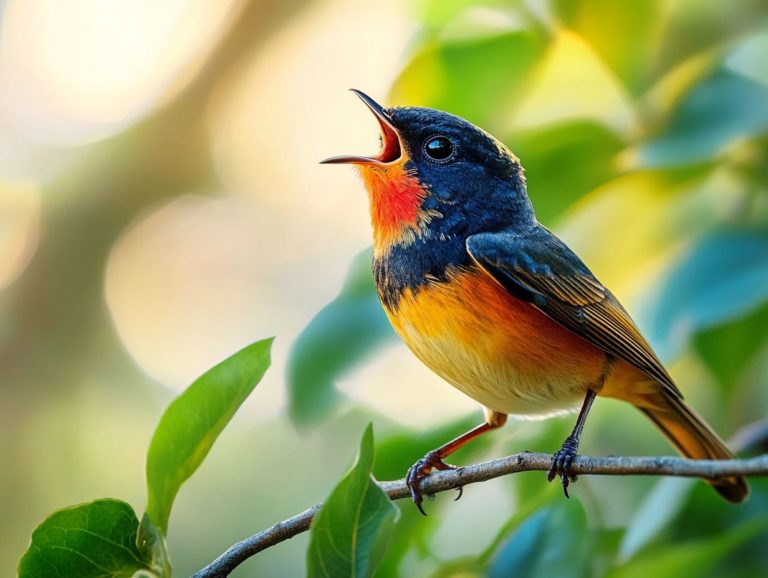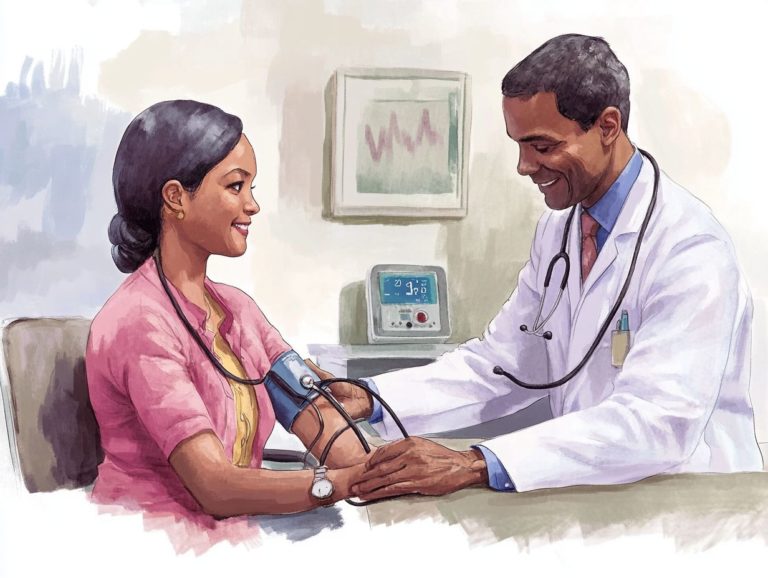How to Handle Emergencies with Your Bird
Owning a bird can fill your life with immense joy, but it also presents its own set of challenges, especially during emergencies. Recognizing signs of distress, mastering basic first aid, and knowing when to seek professional help are vital skills for any bird owner.
Get ready to discover common bird emergencies, essential first aid techniques, and how to create an emergency plan and kit to keep your feathered friend safe. You will also find valuable tips to prevent emergencies and maintain your bird s health and happiness. Continue reading to equip yourself for any situation that may arise!
Contents
- Key Takeaways:
- Common Emergencies with Birds
- First Aid for Birds
- When to Seek Professional Help
- Be Ready for Any Emergency with Your Bird!
- Preventing Emergencies
- Frequently Asked Questions
- 1. What should I do if my bird gets injured?
- 2. How do I know if my bird is experiencing a medical emergency?
- 3. What should I have in a first aid kit for my bird?
- 4. How can I prevent emergencies from happening with my bird?
- 5. What should I do if my bird ingests something toxic?
- 6. Can I give my bird medication in an emergency?
Key Takeaways:
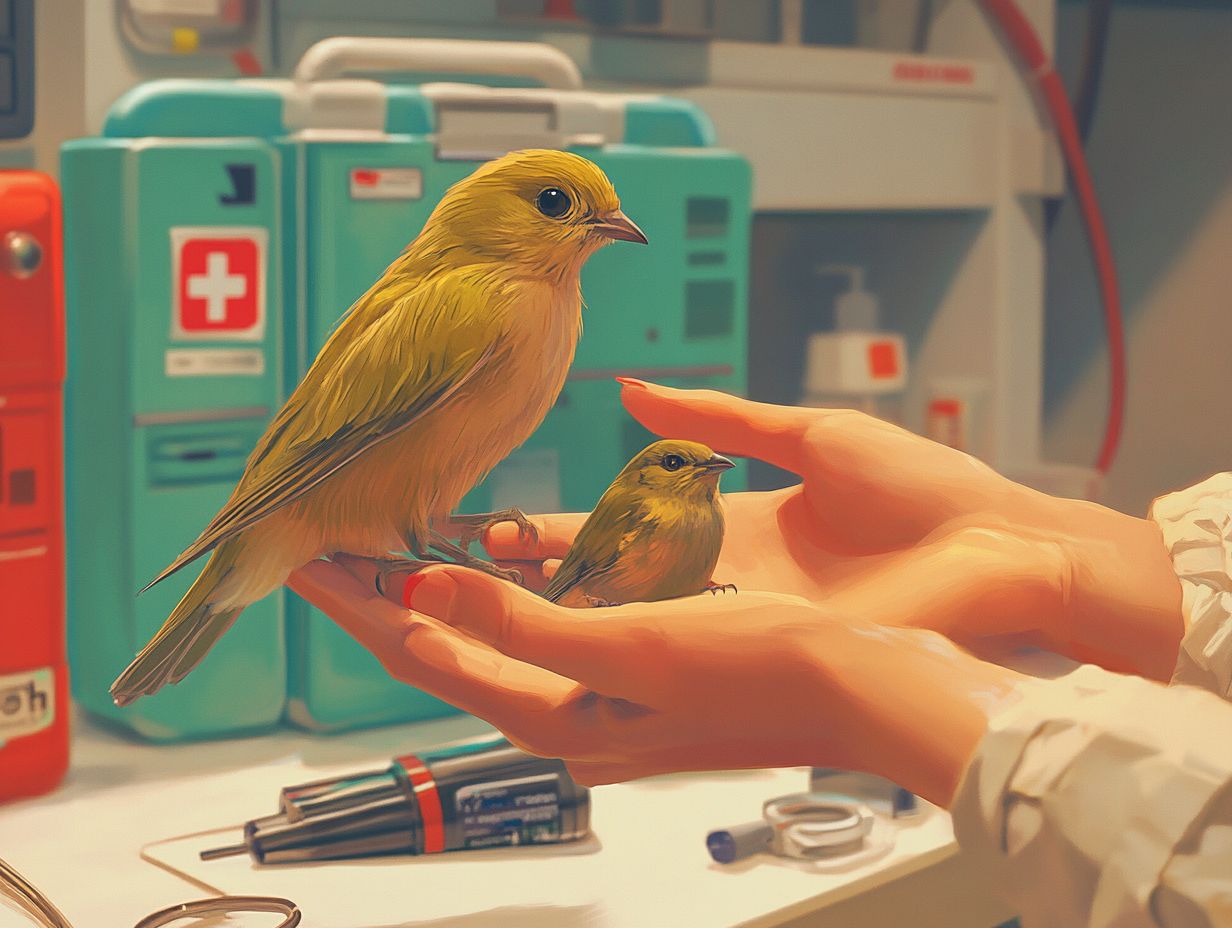
- Be aware of common emergencies and understand how to identify them in your bird. Early recognition can save your bird’s life.
- Know basic first aid techniques for birds to provide temporary care until professional help can be obtained.
- Be attentive to signs that your bird needs veterinary care and seek help immediately to ensure the best chances of recovery.
Common Emergencies with Birds
Understanding common emergencies with birds is essential for you as a pet owner. Timely intervention can greatly influence the health and well-being of your delicate companions. For instance, knowing how to handle a sick bird can make a significant difference. Emergencies often stem from respiratory issues, injuries, or gastrointestinal troubles. Recognizing the signs can be the key to preventing a tragedy.
Your pet bird might encounter situations like egg binding (a condition where a bird cannot lay eggs), shock, or contact with foreign objects, all of which require quick thinking and effective first aid techniques. It s crucial for you to have a solid grasp of how to support your bird in these circumstances and know when it’s time to consult a bird doctor for expert assistance.
Identifying and Understanding Emergency Situations
Identifying and understanding emergency situations in birds means you must recognize key signs. Look for breathing difficulties, which can signal serious respiratory problems or heatstroke both of which demand your immediate attention.
Beyond these critical indicators, keep an eye out for signs like lethargy, unusual vocalizations, and a lack of appetite. Noticing these behavioral changes might point to underlying issues, such as foreign objects blocking the airway or distress from blood feathers.
Symptoms of heatstroke may include rapid breathing, excessive panting, and a droopy posture. Monitoring the temperature of the environment is crucial. Timely recognition of these hazards can be lifesaving, ensuring that you can provide prompt care for your cherished pet bird.
First Aid for Birds
First aid for birds is an essential skill that can make a significant difference. It allows you to provide immediate care in emergencies before professional veterinary help arrives. Mastering effective bird first aid techniques involves knowing how to administer supportive care, control bleeding, and identify when nutritional support is necessary during a health crisis.
A solid understanding of how to handle injuries, treat shock, and ensure proper hydration can significantly impact your pet bird’s recovery. This gives them the best possible chance to thrive.
Basic First Aid Techniques for Birds
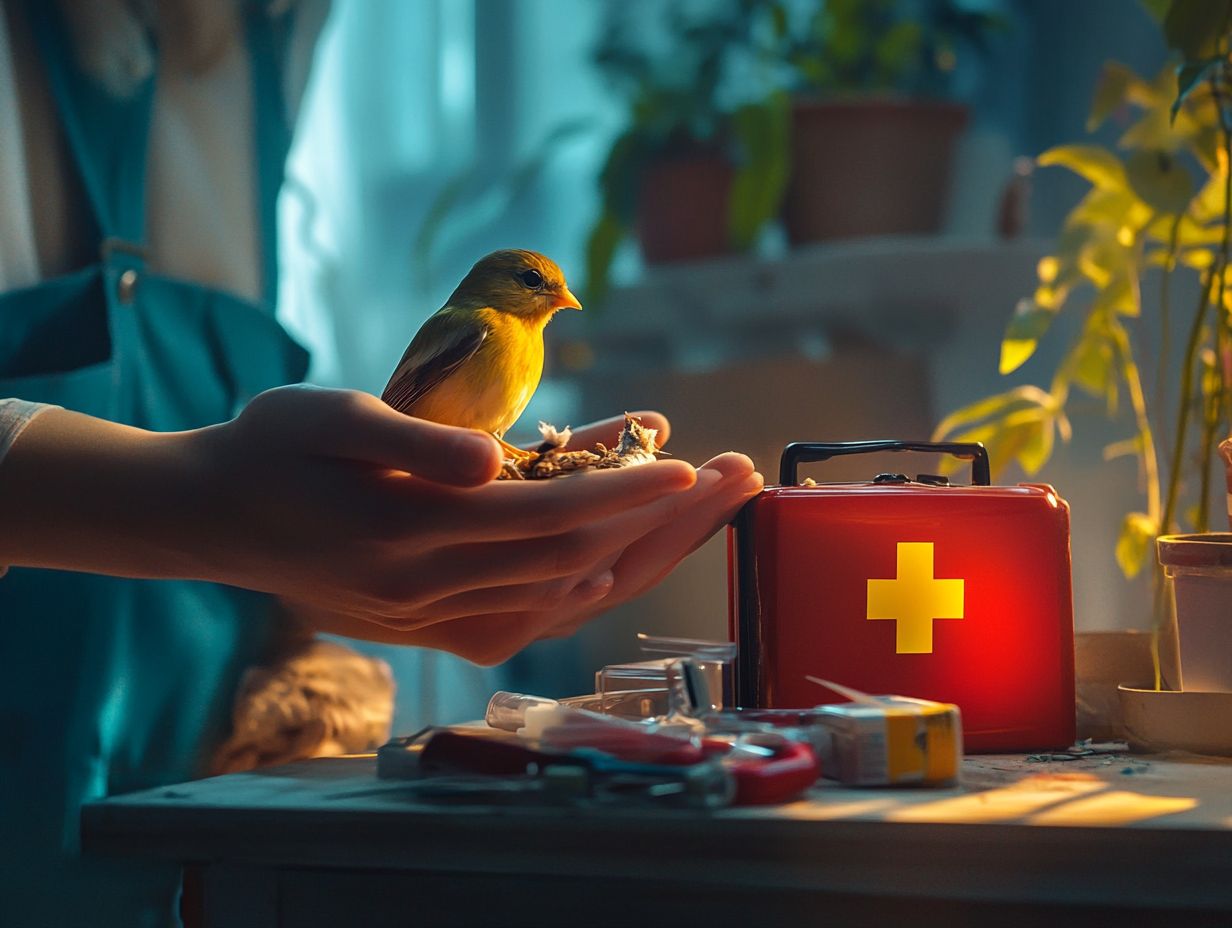
Basic first aid techniques for birds encompass essential skills like assessing and controlling bleeding, providing shock treatment, and safely removing foreign objects. Mastering these techniques is crucial for stabilizing your bird’s condition.
These skills enable you to act swiftly during emergencies, minimizing distress and potential long-term harm. When assessing bleeding, gently examine the affected area while securely holding the bird to prevent further injury. If you identify any bleeding, apply gentle pressure with a clean cloth to help stem the flow.
In cases of shock, create a quiet, safe space and wrap the bird in a warm, soft cloth to calm it. If a foreign object is lodged, it s vital to carefully maneuver and remove it without causing additional harm.
Understanding these first aid methods is essential for immediate intervention and cultivates a proactive approach to caring for your feathered friend.
Have you ever faced an emergency with your bird? Stay prepared and keep your feathered friend safe!
When to Seek Professional Help
Understanding when to seek professional help is crucial for bird owners. Watch for signs that suggest your feathered friend needs veterinary care. Persistent respiratory issues, severe injuries, or sudden changes in behavior are all red flags.
While giving immediate care can be beneficial for stabilizing your pet bird, it s vital to recognize that some conditions require the expertise of a bird doctor or an emergency vet. This ensures they receive the proper treatment and have the best chance at recovery.
Signs that Your Bird Needs Veterinary Care
Recognizing when your bird needs veterinary care can truly be a matter of life and death. Many serious conditions show up through subtle changes in behavior or physical symptoms that only a bird doctor can properly address.
Look out for signs like difficulty breathing, which might appear as labored or shallow breaths. Be alert to lethargy if your usually playful bird suddenly seems sluggish and uninterested, that s a red flag.
Other critical indicators include visible injuries, such as wounds, bleeding, or swelling, which can signal trauma or infection. If your bird starts changing its eating habits, such as refusing food or drinking less water, this could indicate serious underlying health issues.
Regularly monitoring these symptoms is essential. Prompt veterinary intervention can be the key to ensuring your bird s recovery and overall well-being.
Be Ready for Any Emergency with Your Bird!
Every bird owner must be ready for emergencies! It s important to develop a thorough emergency plan and kit tailored to the unique needs of your feathered companions. Knowing the common types of emergencies and having the right supplies can significantly impact the outcome during a crisis.
Your emergency kit should include essential items, such as first aid supplies, contact information for the nearest bird doctor, and clear instructions for immediate care. Act now! Your quick preparations can save your bird’s life when it counts.
Creating an Emergency Plan and Kit for Your Bird
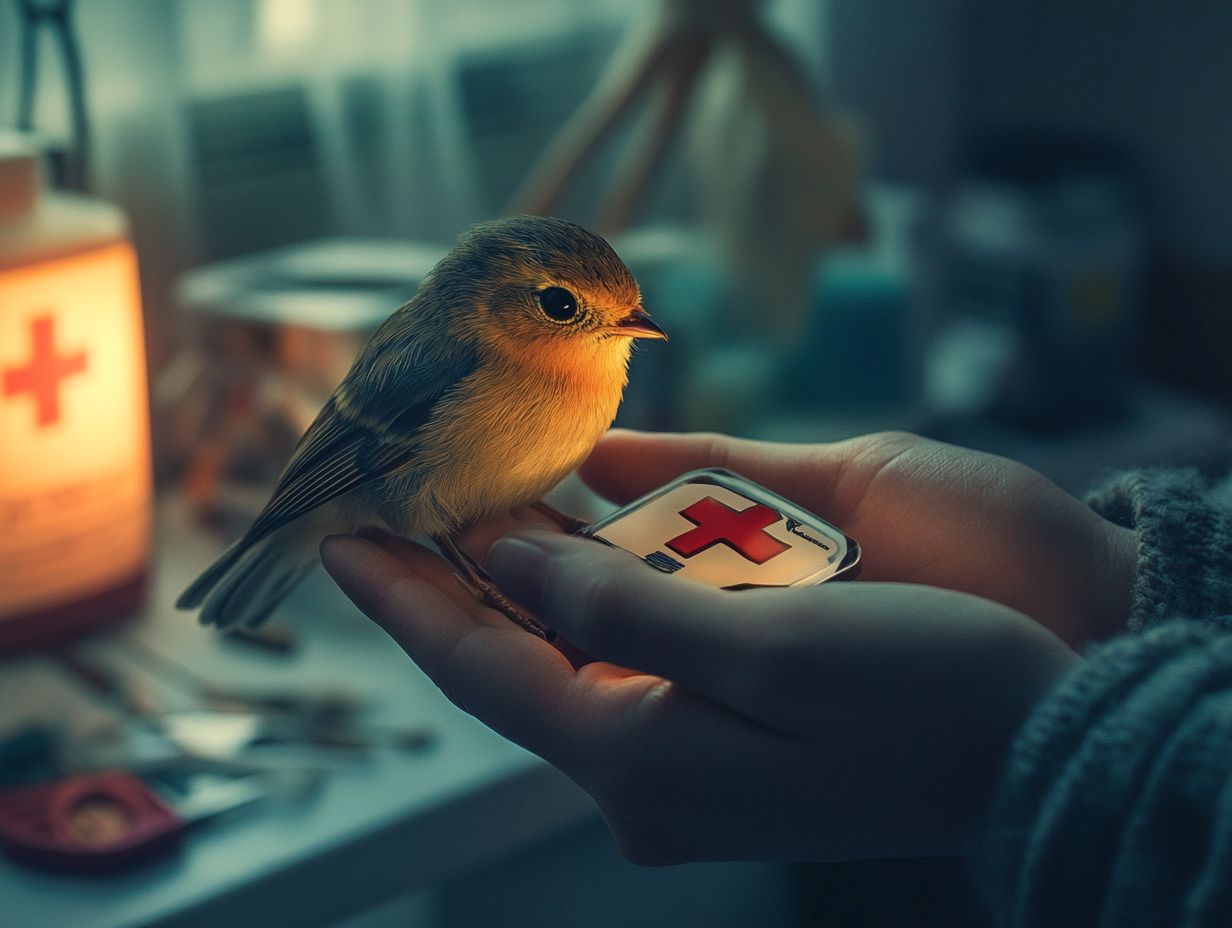
Creating an emergency plan and kit for your bird is a crucial step in ensuring their safety and well-being. Your kit should include essential first aid supplies, contact information for your bird doctor, and clear guidelines for providing supportive care during a crisis.
Beyond these vital components, consider adding a clean, secure carrier for transport, emergency food rations, and water dispensers to keep your bird hydrated. A list of toxic plants and common household hazards specifically tailored to birds will be invaluable in an emergency.
As you formulate your emergency plan, assess potential risks in your environment, such as natural disasters or household emergencies, and establish multiple evacuation routes. Regularly updating this kit and plan is essential; doing so ensures that your resources and information remain current, ultimately reinforcing your bird’s safety during unexpected situations.
Preventing Emergencies
Preventing emergencies is often much simpler than managing them when they arise. Taking proactive measures can greatly improve the health and safety of your beloved pet bird.
By familiarizing yourself with common emergencies and applying effective safety strategies, you can cultivate a secure environment that minimizes potential risks. This involves closely monitoring your bird’s health, providing suitable nutritional support, and ensuring that their living space is free from hazards that could cause injuries or respiratory issues.
Tips for Keeping Your Bird Safe and Healthy
To keep your bird safe and healthy, you should focus on a few key steps. These include regular health monitoring, proper nutrition, and a clean living area to reduce emergencies.
Establish a routine that includes periodic check-ups with a bird doctor. This proactive approach ensures that potential health issues are detected early, allowing for timely intervention.
A balanced diet rich in fruits, vegetables, and high-quality pellets is essential for promoting overall well-being. Creating a spacious and enriching environment not only encourages physical activity but also stimulates your bird’s mental health.
By regularly cleaning the birdcage and its surrounding area, you reduce exposure to harmful bacteria and irritants, ultimately contributing to a vibrant and joyful life for your feathered companion.
Frequently Asked Questions
1. What should I do if my bird gets injured?
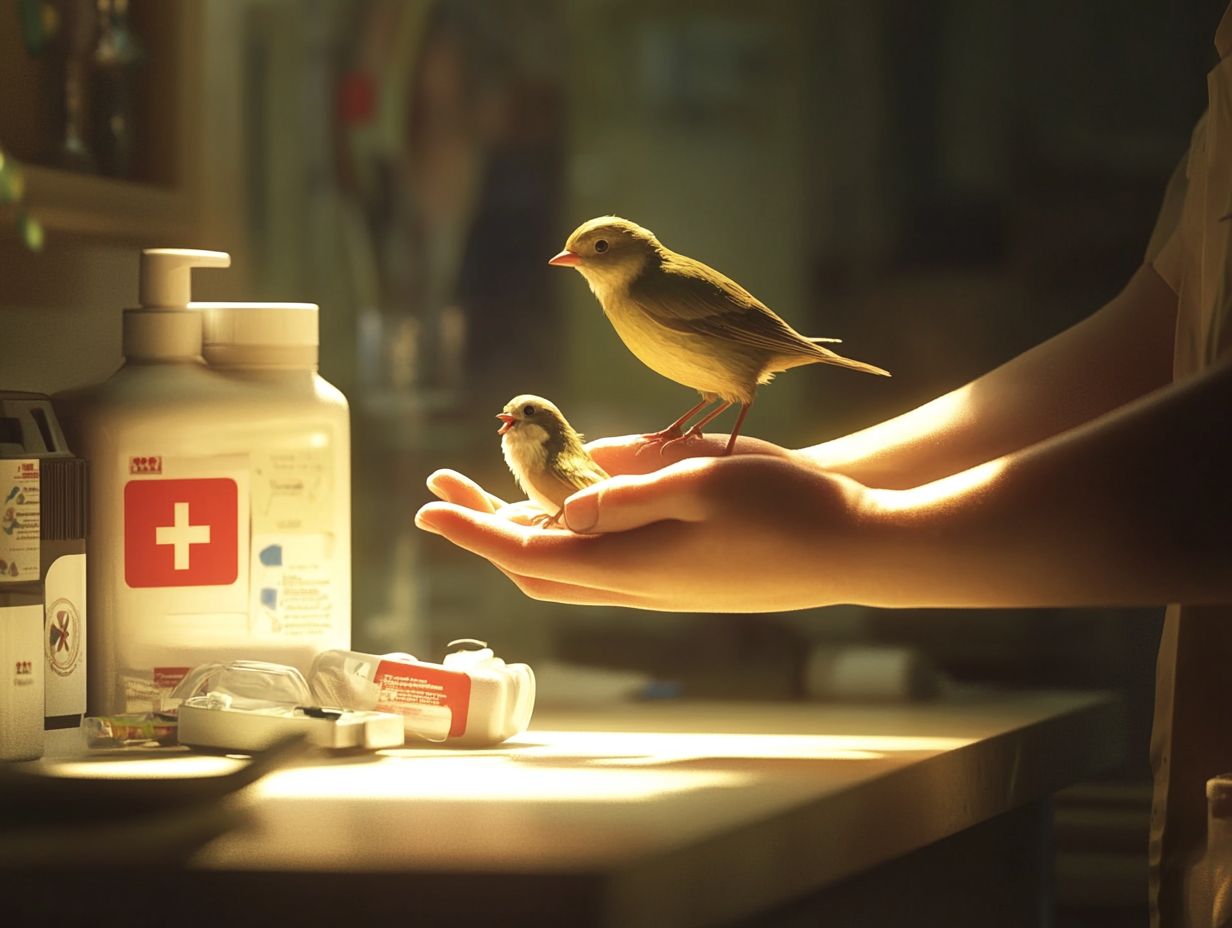
If your bird gets injured, the first thing you should do is assess the severity of the injury. If it is minor, clean the wound with an antiseptic and wrap it with a bandage.
For more serious injuries, take your bird to a veterinarian immediately.
2. How do I know if my bird is experiencing a medical emergency?
Signs of a medical emergency include difficulty breathing, loss of appetite, seizures, or sudden changes in behavior. If you notice any of these signs, contact a veterinarian for advice.
3. What should I have in a first aid kit for my bird?
A first aid kit for your bird should include items such as antiseptic solution, gauze pads, bandages, and styptic powder, which helps stop bleeding. Also, include an electrolyte solution.
Keep your first aid kit stocked and ready for any emergencies!
4. How can I prevent emergencies from happening with my bird?
The best way to prevent emergencies is to provide a safe and healthy environment. This includes regular check-ups with a veterinarian, a proper diet, and avoiding potential hazards.
5. What should I do if my bird ingests something toxic?
If you suspect that your bird has ingested something toxic, do not try to induce vomiting. Instead, contact a veterinarian immediately.
Identifying the substance your bird ingested may help the veterinarian provide better care.
6. Can I give my bird medication in an emergency?
In general, avoid giving medication without consulting a veterinarian first. However, if you have a bird-specific first aid kit, there may be certain medications, such as electrolytes, that are safe to administer.
Always seek professional advice before giving your bird any medication.




